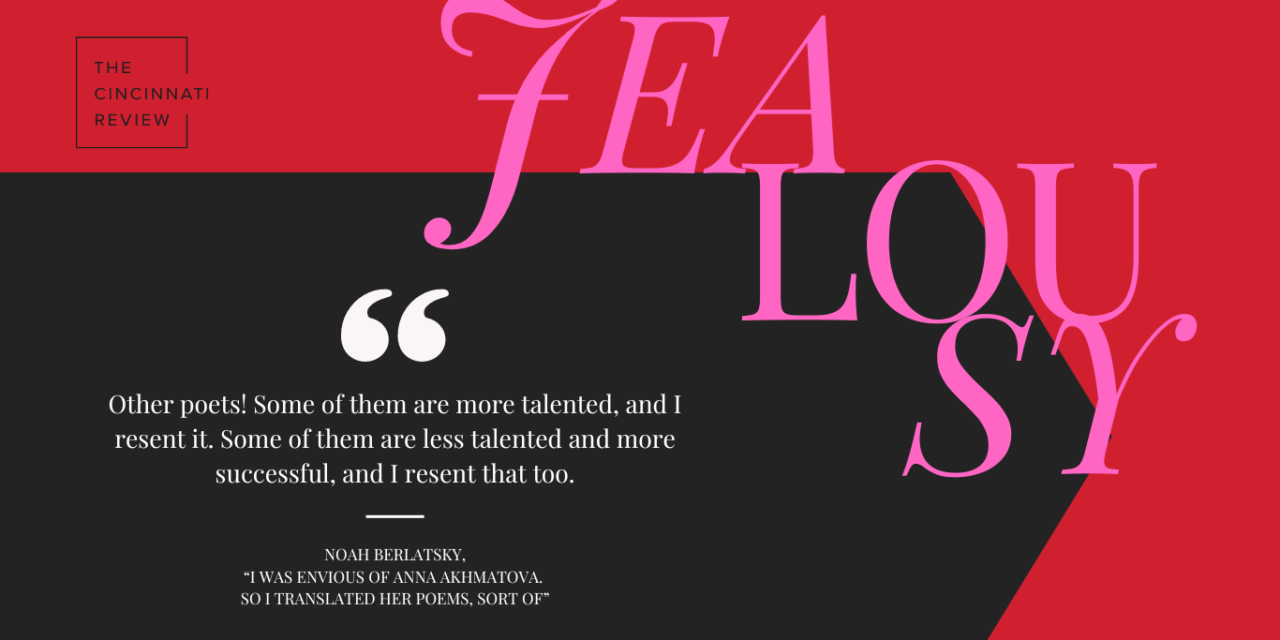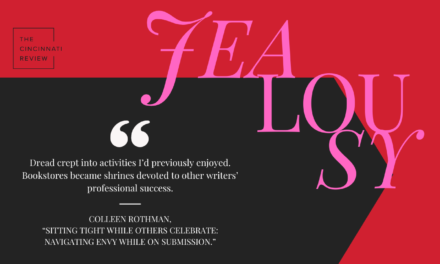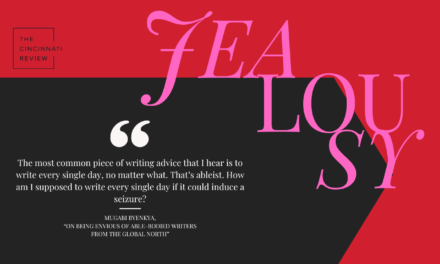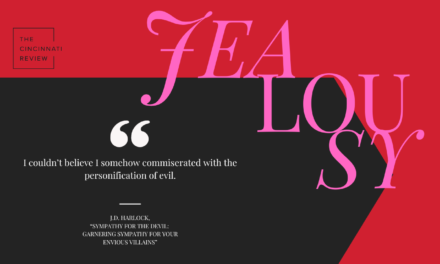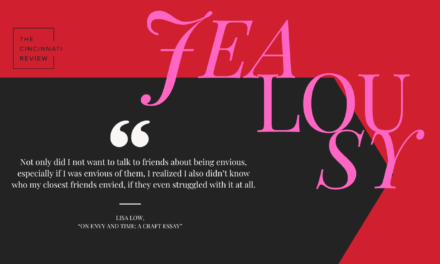To accompany our spring 2024 issue (21.1), we have curated a folio on jealousy and envy. Reading Ravi Mangla’s story “Flavors of Tuscany” in particular inspired us to put together this feature. We initially called it just a “jealousy” feature, which describes what happens in Mangla’s story, but we then expanded it to cover the concept of envy. Though most dictionaries have accepted that jealousy and envy are used nearly synonymously in our culture, the Chicago Manual of Style says, “Jealousy connotes feelings of resentment toward another, particularly in matters relating to an intimate relationship {sexual jealousy}. Envy refers to coveting another’s advantages, possessions, or abilities {his transparent envy of others’ successes}.” For the most part, we follow that formulation of the terms.
Here is Noah Berlatsky’s contribution to that folio:
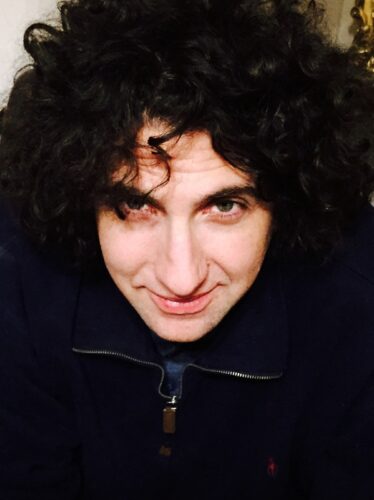
I was envious of Anna Akhmatova. So I translated her poems, sort of.
Just leave your lost and sinful country,
Leave Russian soil forevermore.
—Anna Akhmatova, “When in a suicidal anguish . . .,” translated by Frances Laird
Poets are a jealous lot, and never more so than when forced to deal with other poets. Other poets! Some of them are more talented, and I resent it. Some of them are less talented and more successful, and I resent that too. I suppose somewhere out there is a poet who is both less talented and less successful than me, and I resent them as well, on general principle.
When I first started reading Anna Akhmatova in earnest, I was fascinated, thrilled . . . and also (you probably can guess already) somewhat resentful. Akhmatova is widely considered one of the greatest Russian poets. I’m just some wannabe American with a long-forgotten vaguely Russian Jewish ancestry. It would clearly be silly to resent her talent or her renown, and since I am obviously mature and not silly, I did not resent either of those things much.
Instead I started resenting all her translators who can read Russian and translate Akhmatova because they are not sad uncultured monoglots like myself.
I was irritated at first that I could not read Russian because I wanted to read Akhmatova’s poems in the original. But (since I fancy myself a poet) I quickly transitioned to being irritated at all those other translators because I wanted to translate Akhmatova. None of these other poets (Boo! Hiss! Other poets!) had gotten it right; I could tell that much. There were awkward constructions, awkward lines, awkward rhymes. That could not be the fault of Akhmatova, so it must be the interlopers.
Here, for example, is the final stanza of Akhmatova’s 1924 poem “Lot’s Wife” in D. M. Thomas’s translation:
Who mourns one woman in a holocaust?
Surely her death has no significance?
Yet in my heart she never will be lost,
She who gave up her life to steal one glance.
First of all, I don’t like “Yet in my heart she never will be lost,” with its wordy evocation of emotionally displaced future promises. Why not just go with a more immediate and emotional “Yet in my heart she is not lost”? The final line, too, seems needlessly circuitous, all to get to that final “glance” as a not-especially-convincing rhyme with “significance.” I could do better than that, I told myself—and my self agreed! The only thing keeping me from a brilliant, better-than-D. M. Thomas translation was the fact that the fates have decreed that I, unlike D. M. Thomas, can’t speak Russian.
Or, you know, maybe that’s not the only thing. Thomas, who died last year at the age of eighty-eight, spent his life immersed in Russian history; his 1981 novel, The White Hotel, is a haunted, devastating magical-realist retelling of the Babi Yar massacre, and I would be jealous of it if I wanted to be a novelist. His translations of Akhmatova are, then, informed not just by his knowledge of the language but by his engagement with and love of Russia, its people, and its literature.
That’s important because Akhmatova isn’t just a poet; she’s an icon of Russianness, and of Russian resistance. She lived through the hardship of World War I; after the Revolution her work was denounced and suppressed by the Bolsheviks, and she was reduced to near poverty. Her only son was imprisoned for twenty years as a political prisoner. Akhmatova fought with little success to get some news of his whereabouts throughout his incarceration; those experiences formed the core of arguably her most famous poem, “Requiem.”(“At dawn they came and took you away. / You were my dead: I walked behind,” as translated by Stanley Kunitz and Max Hayward.)
Despite these hardships, though, Akhmatova refused to consider emigration, even as many of her friends left or tried to. “I am not with those who abandoned their land / To the lacerations of the enemy,” she wrote in 1922 (in Judith Hemschemeyer’s translation). “To me the exile is forever pitiful.” She believed that a poet could not thrive separated from their home country; language and land were inextricable. She could be herself only in Russia.
It would be presumptuous for me to translate Akhmatova since I don’t know Russian. But it would be even more presumptuous because I don’t know Russia. I’ve never been there; I have only a vague layman’s acquaintance with its history. If my great-grandparents had stayed there, then maybe I’d be in a position to have some claim on Akhmatova. But they left in the early twentieth century for the reason that most Jewish people left Russia in the early twentieth century: enforced poverty, pogroms, discrimination.
In envying that self who could justifiably translate Akhmatova and call her his own, then, I am envying a self not marked by diaspora. My people, Jewish people, are among those folks who Akhmatova labels as “pitiful.” I’m one of those poets who she says can’t thrive in exile. My family’s language was Russian, but I don’t have it anymore. Time and the border took it.
When I started to think about it that way, I was still maybe a little jealous. But I was also irritated. The twenty-first-century United States is by no means as anti-Semitic as early-twentieth-century Russia. But still, if you’re Jewish in the diaspora, one of the things you get told throughout your life (not least by Israeli Zionists) is that you don’t really belong where you are.
Jewish people in the diaspora are, supposedly, “rootless cosmopolitans,” without a place or a culture of their own. Being chased from place to place, from Russia to America, is, from this perspective, a moral and spiritual failing. When Whitman and Dickens were writing, my ancestors were looking around their shtetl and wishing they were somewhere else. When Akhmatova was writing, my ancestors were doing their best to leave her to her own particular Russian misery. So, who’s my tradition? Whose words do I get to build on and take for mine?
One of the strengths of diaspora is that historically, Jewish people (like, say, Robert Zimmerman or Muriel Rukeyser) have decided to answer those questions simply by refusing to abide by ethnonationalist presumptions about whose culture is whose, or about who gets to speak from where. For the diaspora, you are what you love and care about, rather than where you’re from. And if I love and care about Akhmatova, in part because she’s one version of where I come from and where I could be—well, why not just go with that, rather than (or in addition to!) being jealous because I can’t?
So, with some bitterness, some hope, and some help from Google Translate, I started writing my own versions/translations/responses to Akhmatova’s poems. I didn’t exactly try for accuracy, since I don’t speak Russian—and also because, much as I admire Akhmatova’s writing and her life, I don’t exactly want to be true to her. She’s Russian in a way that my history and ancestry hasn’t let me be, even though her suffering, at the hands of Russians, was certainly something my grandparents would have understood.
Jealousy is a kind of self-hatred or self-rejection; it’s an anger or bitterness that you’re not someone different or better, someone smarter, more talented, happier, more successful, less despised. Diaspora Jews, stereotypically, are supposed to be envious of ethnonationalist rootedness and belongingness; we’re supposed to recognize that we don’t fit, and we’re supposed to hate ourselves for it.
Thinking about Akhmatova, though, and writing with and against her made me realize that jealousy can also be about recognizing the ruptures and the not-yous that make you who and where you are. If Akhmatova was brave for staying, maybe my ancestors were brave for going away. And if that language isn’t mine anymore, this language I picked up can still speak, clumsily or otherwise, to that loss. Akhmatova was afraid that crossing borders would make her lose her self. But one element of what I learned is that I envy what I don’t have in part because what I don’t have is me.
Lot’s Wife (as translated by Noah Berlatsky)
The righteous man followed God’s messenger,
huge and terrible, like a black mountain.
His great back to Lot’s wife was sorrow and fear.
She longed to stop and see just once again
the white spires of her home, the place
in the square where she sang to her children.
The windows of the house where in joy and pain
she gave birth to her children.
And so she turned back, for one last sight.
Her eyes like those windows were empty.
Her body was a pillar of salt, bleached white.
Her feet were rooted in place, like a memory.
We aren’t supposed to mourn her.
She’s a fool, and so many others burned.
They say do not look towards her
who defied God, and turned.
Noah Berlatsky (he/him) is a freelance writer in Chicago. His first full-length poetry collection, Not Akhmatova, is available for preorder from Ben Yehuda Press. He’s also published chapbooks from above/ground, Origami Poems Project, and LCJMcD Communications. He scribbles regularly at his Substack, Everything Is Horrible.

